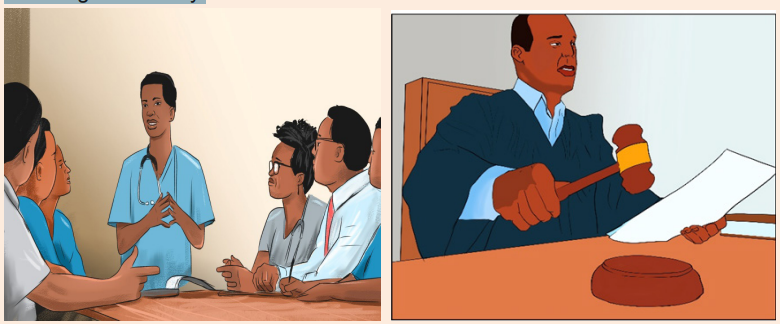UNIT 3: LEGAL RESPONSIBILITIES IN NURSING
Self-assessment 3.1Key Unit Competence
Practice nursing in a standardized and responsible manner
3.0 Introductory activity
Look at the following image of the nurse in the nursing station then read the following case study

A female client of 39 years old have undergone a surgical intervention for suspicion of peritonitis. During the immediate postoperative period, the client has complained of abdominal pain, vomiting and pain not controlled before she left the recovery room.
She called the same day surgery nurse later in the day complaining of increasing pain and vomiting, weakness and significant fatigue. The nurse assigned to monitor clients after surgery made the assumption that these symptoms were related to her surgery as it happens to many others clients and don’t pay attention to the complaints. The caregiver also go to ask to the nurse to come and see the client but she keeps quietly seated on the chair in the nursing station. Later she come and advised the patient and care giver to wait and see the evolution and don’t inform the surgeon. The patient had, in fact, during vomiting effort ruptured some hemostatic sutures and started to bleed in the peritoneal cavity. The patient later died of hypovolemic shock not corrected on time. The vital signs were not monitored and no further assessment done
This case is an example of the nurse negligence and jumping to a conclusion about the cause of the patient’s complaints and failing to error on the side of caution. Even if pain and vomiting are frequent complaints following abdominal surgery, the nurse have not been aware about possible complications which may arise. After the client death the family has addresses a complaint to the court
1) Identify the nurse responsibilities that were not assumed
2) List the complications which have occurred due to no accomplishment of the nurse’s responsibilities 3) Has the family member right to complain legally? Why?
3.1. Functions of Law in Nursing
Learning activity 3.1
Read carefully the case study below and answer to the related questions A male client of 25 years old named N have attended the health center complaining for lower abdominal pain, fever and pain during urination. These problems are evolving since 3 days and has taken some drugs for relieving pain but he has still abdominal pain and burning urination. On admission, the nurse was busy on personal issues on phone, has received 3 clients who come after Monsieur N and don’t pay attention to the client for a while. When the nurse receive the client N, he starts by blaming the client about his sexual attitude and other clients were following the conversation and at the end he asks to the client to go somewhere else without a reference note as the health center has no Doctor to manage such case and the nurse says that he is not able to treat the client N.
Monsieur N was very unhappy and decide to complain against the nurse for being not well cared.
1) Identify the activities carried out by the nurse which are not correct in nursing profession
2) Identify 2 legal nursing responsibilities not assumed by the nurse
The term “legal responsibilities” means that responsibility which the law attaches to particular conduct of a nurse.
Law can be defined as those rules made by humans who regulated social conduct in a formally prescribed and legally binding manner. Laws are very important for fairness and justice, and bring order in society 22 Ethics and professional code of conduct - Student book - Senior 5 It has developed over the centuries to balance the rights of individual. However laws always respond to changes, to customs, advancement of technology and needs of the society. Law imposes a duty on everyone to conform to certain standards of conduct for the protection of others
• It provides a framework for establishing which nursing actions in the care of patient are legal.
• It differentiates the nurse’s responsibilities from those of other health professional.
• It helps to establish the boundaries of independent nursing action.
• It assists in maintaining a standard of nursing practice by making nurses accountable under the law.
• To protect the rights of the individuals according to the needs of the society.
• To correct inequalities in the society.
• To punish people engaged in forbidden behavior
• Law governs the relationship of private individuals with government and with each other.
Self-assessment 3.1
After reading and understood the content summary on legal issues, answer to the following questions:
1) Explain 2 roles of the law in the practice of nursing profession?
2) Is the law helps you to practice better the profession or impede with your practice?
3.2. Legal responsibilities of nurse
Learning activity 3.2
Mr.T was admitted in Medical unit after having severe headache following a long lasting high blood pressure. The nurse on night duty have not observed that the client blood pressure was high and the client have not received the drug prescribed as the caregiver was not informed or receiving the medical order to buy them in the pharmacy. After the morning shift, the caregiver call the nurse H for help as the client has epistaxis (blood from the noise) and was agitated. The nurse was doing many tasks including completing files in the machine for discharging clients and don’t pay attention to the complaint addressed by the care giver about the nose bleeding until the client develops coma status.
When the Physician arrives he concludes to a probable stroke due to a very high blood pressure not well managed
1) Identify the responsibilities of the nurse that he has not assumed
• Responsibility in the appointment at work: Each nurse has legal responsibility to make full disclosure of her or his background knowledge and skills and notify the nurse manager when given an assignment for which she or he is not qualified. Less experienced or less skilled employees need more professional support and advice from the manager
• Responsibility for Equipment: To protect patients, colleagues and self from injury, a nurse must ensure that all patient care equipment are fully functional and that defective equipment is promptly repaired or replaced.
• Responsibility for observation and reporting: Nursing personnel have more frequent and prolonged patient contact than other care-giver. Nurses are trained to detect and report significant symptoms and reactions.
Consequently, nurses have a legal duty to observe patients frequently and report findings that have diagnostic or treatment value for the patient’s physician and other members of the patient’s treatment team. The nurse also must report all observations and care provided to the client including drugs, routes of administration, and patient outcomes.
Acts not recorded = acts not done
The nurse is expected to observe a patient more closely when his or her condition indicates increased health risks like infants, children, aged, disoriented psychiatric and critically ill patients who require more frequent observation than other patients.
When the patient’s condition deteriorates to the point that immediate action is needed to save life, the nurse must report observations of the patient’s worsening conditions to the concerned doctor, health care team and direct supervisor. A clear, accurate, and accessible documentation is an essential element of safe, quality, evidence-based nursing practice. It is an important document for the continuity of care, Communication within the Health Care Team and Communication with Other Professionals
• Responsibility for Record Keeping
Nurses have legal responsibility for accurately reporting and recording patient’s conditions, treatments and responses to care. The medical record is a written or computerized account of a patient’s illness and treatment that includes information submitted by all members of the patient’s health care team. The medical record is an information source document that should be used to plan care, evaluate care, allocate costs, educate personnel, research care measure, and substantiate legal claim
• Responsibility to Protect
Public The nurse has a legal duty to protect the public from injury by dangerous patients. Each nurse manager or administrator should ensure that the health care setting in which she or he is employed has a policy describing the procedure to be followed when a patient with violent tendencies or who threatens violence to others is discharged or escapes from the health care setting. Reporting information about criminal acts obtained during patient care, should be done only to the concerned authority, because it is considered a privileged communication.
Self-assessment 3.2
What are the legal responsibities of a nurse?
3.3. End unit assessment
End unit assessment
1. Law is defined as those rules made by humans who regulated social conduct in a .formally prescribed and legally binding manner. The following are functions of law in nursing except:
a. It provides a framework for establishing which nursing actions in the care of client are legal.
b. It differentiates the nurse’s responsibilities from those of other health professional.
c. It recommend nurses to respect Doctors in medical services
d. It helps establish the boundaries of independent nursing action.
2. In which of these situations could the nurse in collaboration with medical team take responsibility about the treatment decision of the client is legally made?
a. Never, patients or their legal guardians, always have the right to make their own treatment decision
b. When the patient’s initial decision may do more medical harm than good
c. When the physician disagrees with the patient’s decision
d. When the patient is not competent to make a decision and there is no family or legal guardian available
SECTION II : ANSWER BY TRUE OR FALSE
Read carefully the following statement and answer by T if it is true or by F it is false
1) The nurse documentation is a way of communication only within the health care team report
2) When the nurse violated standards of nursing practice, litigation and loss of license to practice can occur
3) The purpose of law in nursing profession is only to decide sanction against nurses in case of negligence and malpractice
4) They nurse has obligation or willingness to accept responsibility or to be held accountable for one’s actions
5) During the exercise of nursing profession, the nurse has responsibility in proper and safe use of medical equipment
SECTION III: SHORT ANSWER QUESTIONS
1) Explain 4 examples of data to record in nursing documentation
2) Enumerate four characteristics of the nursing documentation and records
3) Explain two (2) importance of the nursing documentation
4) Explain 3 benefits of legal sanction for the nurse in order to assume his /her responsibilities
5) Enumerate 3 types of legal responsibilities of a nurse
